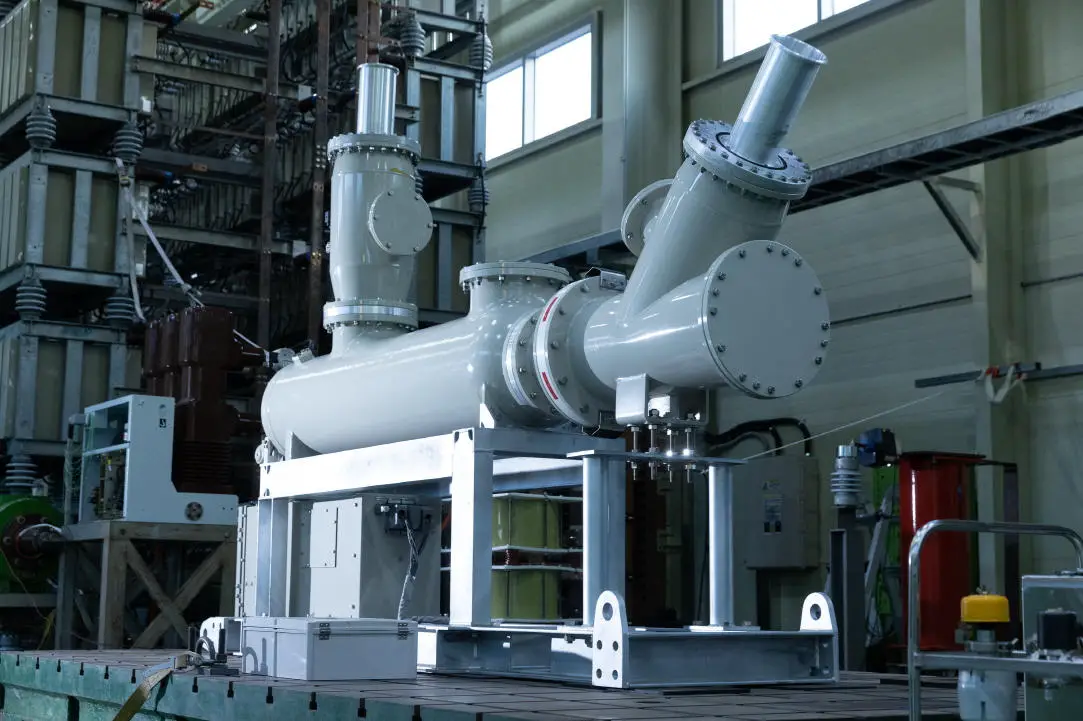The Korea Electrotechnology Research Institute (KERI) has innovated a new eco-friendly insulating gas, named ‘K6’, to replace sulfur hexafluoride (SF6), known for its harmful environmental impact. K6 stands out for its minimal global warming potential and non-toxic properties. This breakthrough has been successfully implemented in ultra-high voltage circuit breakers, marking a significant advancement in the power equipment sector. It is poised to play a critical role in reducing greenhouse gas emissions and aiding in the fight against climate change. Attribution: Korea Electrotechnology Research Institute
KERI has been at the forefront of replacing SF6, a major contributor to global warming in electric power equipment, with this novel eco-friendly insulating gas. Additionally, they have formulated design technology to integrate this gas into ultra-high voltage transmission circuit breakers.
SF6 has been the go-to gas for over 50 years in the power equipment field due to its excellent insulation qualities and unmatched arc extinguishing capabilities, which are crucial for interrupting fault currents during system failures.
Table of Contents
The Issue with SF6
SF6’s global warming potential is alarmingly high, at 23,500 times that of carbon dioxide. Once released into the atmosphere, it can persist for up to 3,200 years, posing significant environmental hazards.
In Korea, SF6 emissions from KEPCO account for 60% of the total greenhouse gases, necessitating urgent research for alternatives to address the climate crisis and achieve carbon neutrality.
Challenges in Finding SF6 Substitutes
The quest for an eco-friendly SF6 replacement is global, yet achieving remarkable results has been as challenging as developing new pharmaceuticals. The hurdles include varying chemical use regulations across countries, potential legal disputes due to the sensitive nature of the chemical, the high cost and time requirements for private sector development, and limited capabilities in gas material analysis.
Despite these challenges, KERI, driven by its national research institute mandate, embarked on this project with the goal of complying with global carbon emissions regulations and the anticipated significant impact of developing an SF6 alternative.
Creation of ‘K6’ Gas
KERI’s Eco-Friendly Power Apparatus Research Center spearheaded the development of ‘K6’, an eco-friendly insulating gas as a substitute for SF6. This involved identifying low global warming potential gases, closely analyzing the electrical and chemical properties of primary candidates, and conducting insulation and explosion/ignition control performance tests to select the final materials. The ‘K6’ name signifies the 6th round of selections in the candidate group under KERI’s direction.
The K6 gas is environmentally benign, with less than 1 global warming potential, and is free of hazardous toxic ingredients. Its low boiling point of –26°C makes it suitable for use in a wide range of areas.
Impact and Prospects
KERI has successfully applied K6 gas in ultra-high voltage (145kV) transmission-level circuit breakers, meeting International Electrotechnical Commission standards. They plan to extend its use across various power devices, from distribution to transmission.
Dr. Yeon-ho Oh, from KERI’s Eco-Friendly Power Apparatus Research Center, highlighted K6’s superior performance and environmental benefits compared to other insulating gases. He emphasized the significant impact of K6’s development on both environmental and economic fronts, given Korea’s leading position in the global power device industry.
KERI aims to commercialize this technology through transfers to Korean power apparatus companies, enhancing the competitiveness of the domestic industry by establishing clear design standards for eco-friendly gas use. The research was a collaborative effort involving several Korean institutes, under the guidance of the National Research Council of Science & Technology and the Ministry of Science and ICT.
Frequently Asked Questions (FAQs) about Eco-friendly Insulating Gas
What is the new eco-friendly insulating gas developed by KERI?
KERI has developed a new eco-friendly insulating gas called ‘K6’, intended to replace sulfur hexafluoride (SF6) in power equipment, known for its high global warming potential.
Why was there a need to replace SF6 in power equipment?
SF6, though effective for insulation in power equipment, has a global warming potential 23,500 times that of carbon dioxide and persists in the atmosphere for over 3,000 years, necessitating the development of a more environmentally friendly alternative.
What are the environmental benefits of K6 compared to SF6?
K6 has a significantly lower global warming potential than SF6, less than 1, and does not contain seriously toxic ingredients, making it a more environmentally sustainable choice.
How does K6 perform in comparison to SF6 in power equipment?
K6 has been successfully applied to ultra-high voltage (145kV) transmission-level circuit breakers, meeting international standards and demonstrating superior performance and safety features similar to SF6.
What are the future plans for the application of K6 gas?
KERI plans to extend the application of K6 gas across various power devices, including breakers, transformers, and switches, from distribution to transmission levels, contributing to global efforts in reducing greenhouse gas emissions.
More about Eco-friendly Insulating Gas
- Korea Electrotechnology Research Institute
- SF6 and Global Warming
- Eco-Friendly Power Equipment
- Advancements in Circuit Breaker Technology
- KERI’s Eco-Friendly Initiatives
- Global Efforts in Reducing Greenhouse Gases
- New Insulating Gases in Power Industry
- Korea’s Contribution to Sustainable Energy Tech



5 comments
Interesting read… but I wonder how quickly this K6 can be adopted worldwide? Costs and regulations might be an issue?
wow, didn’t know about this K6 stuff, sounds like a game changer for the environment!
So KERI’s really stepping up with this innovation. It’s high time we found alternatives to SF6, right?
Kudos to KERI for leading the charge against global warming. More such initiatives needed globally.
it’s great to see such progress in eco-friendly tech, really gives hope for the future, you know?